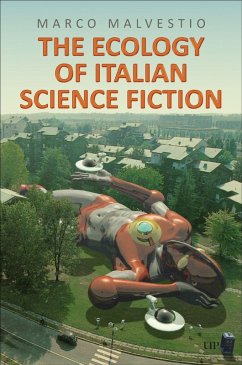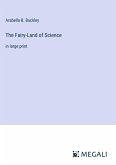Marco Malvestio
The Ecology of Italian Science Fiction
Marco Malvestio
The Ecology of Italian Science Fiction
- Gebundenes Buch
- Merkliste
- Auf die Merkliste
- Bewerten Bewerten
- Teilen
- Produkt teilen
- Produkterinnerung
- Produkterinnerung
This book illuminates interactions between Italian environmental history and science fiction, offering fresh insights into how literary imagination has addressed ecological changes in the latter half of the twentieth century.
Andere Kunden interessierten sich auch für
![Food and Emotions in Italian Women's Writing Food and Emotions in Italian Women's Writing]() Patrizia SambucoFood and Emotions in Italian Women's Writing77,99 €
Patrizia SambucoFood and Emotions in Italian Women's Writing77,99 €![Life Life]() Vittorio AlfieriLife99,99 €
Vittorio AlfieriLife99,99 €![The Fairy-Land of Science The Fairy-Land of Science]() Arabella B. BuckleyThe Fairy-Land of Science69,90 €
Arabella B. BuckleyThe Fairy-Land of Science69,90 €![The History of the White Mountains, From the First Settlement of Upper Coos and Pequaket The History of the White Mountains, From the First Settlement of Upper Coos and Pequaket]() Lucy Howe CrawfordThe History of the White Mountains, From the First Settlement of Upper Coos and Pequaket37,99 €
Lucy Howe CrawfordThe History of the White Mountains, From the First Settlement of Upper Coos and Pequaket37,99 €![The Prairie-Bird The Prairie-Bird]() Charles Augustus MurrayThe Prairie-Bird31,99 €
Charles Augustus MurrayThe Prairie-Bird31,99 €![Dante's Ten Heavens Dante's Ten Heavens]() Edmund Garratt GardnerDante's Ten Heavens26,90 €
Edmund Garratt GardnerDante's Ten Heavens26,90 €![The White Mountain Guide Book The White Mountain Guide Book]() Samuel Coffin EastmanThe White Mountain Guide Book69,90 €
Samuel Coffin EastmanThe White Mountain Guide Book69,90 €-
-
-
This book illuminates interactions between Italian environmental history and science fiction, offering fresh insights into how literary imagination has addressed ecological changes in the latter half of the twentieth century.
Hinweis: Dieser Artikel kann nur an eine deutsche Lieferadresse ausgeliefert werden.
Hinweis: Dieser Artikel kann nur an eine deutsche Lieferadresse ausgeliefert werden.
Produktdetails
- Produktdetails
- Verlag: University of Toronto Press
- Seitenzahl: 256
- Erscheinungstermin: 15. Mai 2025
- Englisch
- Abmessung: 229mm x 152mm x 25mm
- ISBN-13: 9781487554705
- ISBN-10: 1487554702
- Artikelnr.: 73109681
- Herstellerkennzeichnung
- Libri GmbH
- Europaallee 1
- 36244 Bad Hersfeld
- gpsr@libri.de
- Verlag: University of Toronto Press
- Seitenzahl: 256
- Erscheinungstermin: 15. Mai 2025
- Englisch
- Abmessung: 229mm x 152mm x 25mm
- ISBN-13: 9781487554705
- ISBN-10: 1487554702
- Artikelnr.: 73109681
- Herstellerkennzeichnung
- Libri GmbH
- Europaallee 1
- 36244 Bad Hersfeld
- gpsr@libri.de
By Marco Malvestio
Acknowledgments
Note on Texts Translations
Introduction: The Ecology of Italian Science Fiction
Science Fiction and the Limits of Taxonomy
The Crisis of Imagination
Landing in Lucca: Italian Science Fiction in Context
Studying Italian Science Fiction: The Tools of the Trade
The Anthropocene and Italian Science Fiction: Overview of the Book
Part I: Post-Boom Wastelands
1. The Price of Oil: Petroculture and Environmental Degradation
Overpopulation, Urban Sprawl, Environmental Degradation: Petro-Modernity in
the Stories of Lino Aldani
The Trouble with Cars: Automobiles in Pierfrancesco Prosperi and Lino
Aldani
2. Lives in the Wasteocene: Environmental Justice and the Necropolitics of
Disposability
Wasted People: Environmental Migration in Paolo Zardi and Bruno Arpaia
The Necropolitics of Disposability: Livido and Pulphagus®
Part II: Encountering Non-Human Otherness
3. Domestic Jungles and Murderous Megaflora: Plants in Italian Science
Fiction
The Fear of Vegetal Assimilation: Mario Bava’s Caltiki and Giorgio
Scerbanenco’s L’anaconda
The Benevolent Monstrosity of Plants: Gilda Musa’s Giungla domestica
4. Texts of Meat: Representing Animal Exploitation
Crossing to the Other Shore: Animal Exploitation in Lino Aldani
Mermaids Like Us: Animal Farming and Gendered Violence in Laura Pugno
Part III: Exit Strategies
5. Alternative Ethics: Ecofeminism in Italian Science Fiction
Women Experimenting: The Feminist Ecologies of Gilda Musa
Humus Sapiens: Gendered Violence and Composting Feminism in Nicoletta
Vallorani
6. New Energies, New Minds: Italian Solarpunk and the Imagination of
Sustainability
Solar, Not Sunny: Solarpunk in Italy
The Light Green: The Imagery of Italian Solarpunk
Conclusion: A Matter of Imagination
Notes
Works Cited
Index
Note on Texts Translations
Introduction: The Ecology of Italian Science Fiction
Science Fiction and the Limits of Taxonomy
The Crisis of Imagination
Landing in Lucca: Italian Science Fiction in Context
Studying Italian Science Fiction: The Tools of the Trade
The Anthropocene and Italian Science Fiction: Overview of the Book
Part I: Post-Boom Wastelands
1. The Price of Oil: Petroculture and Environmental Degradation
Overpopulation, Urban Sprawl, Environmental Degradation: Petro-Modernity in
the Stories of Lino Aldani
The Trouble with Cars: Automobiles in Pierfrancesco Prosperi and Lino
Aldani
2. Lives in the Wasteocene: Environmental Justice and the Necropolitics of
Disposability
Wasted People: Environmental Migration in Paolo Zardi and Bruno Arpaia
The Necropolitics of Disposability: Livido and Pulphagus®
Part II: Encountering Non-Human Otherness
3. Domestic Jungles and Murderous Megaflora: Plants in Italian Science
Fiction
The Fear of Vegetal Assimilation: Mario Bava’s Caltiki and Giorgio
Scerbanenco’s L’anaconda
The Benevolent Monstrosity of Plants: Gilda Musa’s Giungla domestica
4. Texts of Meat: Representing Animal Exploitation
Crossing to the Other Shore: Animal Exploitation in Lino Aldani
Mermaids Like Us: Animal Farming and Gendered Violence in Laura Pugno
Part III: Exit Strategies
5. Alternative Ethics: Ecofeminism in Italian Science Fiction
Women Experimenting: The Feminist Ecologies of Gilda Musa
Humus Sapiens: Gendered Violence and Composting Feminism in Nicoletta
Vallorani
6. New Energies, New Minds: Italian Solarpunk and the Imagination of
Sustainability
Solar, Not Sunny: Solarpunk in Italy
The Light Green: The Imagery of Italian Solarpunk
Conclusion: A Matter of Imagination
Notes
Works Cited
Index
Acknowledgments
Note on Texts Translations
Introduction: The Ecology of Italian Science Fiction
Science Fiction and the Limits of Taxonomy
The Crisis of Imagination
Landing in Lucca: Italian Science Fiction in Context
Studying Italian Science Fiction: The Tools of the Trade
The Anthropocene and Italian Science Fiction: Overview of the Book
Part I: Post-Boom Wastelands
1. The Price of Oil: Petroculture and Environmental Degradation
Overpopulation, Urban Sprawl, Environmental Degradation: Petro-Modernity in
the Stories of Lino Aldani
The Trouble with Cars: Automobiles in Pierfrancesco Prosperi and Lino
Aldani
2. Lives in the Wasteocene: Environmental Justice and the Necropolitics of
Disposability
Wasted People: Environmental Migration in Paolo Zardi and Bruno Arpaia
The Necropolitics of Disposability: Livido and Pulphagus®
Part II: Encountering Non-Human Otherness
3. Domestic Jungles and Murderous Megaflora: Plants in Italian Science
Fiction
The Fear of Vegetal Assimilation: Mario Bava’s Caltiki and Giorgio
Scerbanenco’s L’anaconda
The Benevolent Monstrosity of Plants: Gilda Musa’s Giungla domestica
4. Texts of Meat: Representing Animal Exploitation
Crossing to the Other Shore: Animal Exploitation in Lino Aldani
Mermaids Like Us: Animal Farming and Gendered Violence in Laura Pugno
Part III: Exit Strategies
5. Alternative Ethics: Ecofeminism in Italian Science Fiction
Women Experimenting: The Feminist Ecologies of Gilda Musa
Humus Sapiens: Gendered Violence and Composting Feminism in Nicoletta
Vallorani
6. New Energies, New Minds: Italian Solarpunk and the Imagination of
Sustainability
Solar, Not Sunny: Solarpunk in Italy
The Light Green: The Imagery of Italian Solarpunk
Conclusion: A Matter of Imagination
Notes
Works Cited
Index
Note on Texts Translations
Introduction: The Ecology of Italian Science Fiction
Science Fiction and the Limits of Taxonomy
The Crisis of Imagination
Landing in Lucca: Italian Science Fiction in Context
Studying Italian Science Fiction: The Tools of the Trade
The Anthropocene and Italian Science Fiction: Overview of the Book
Part I: Post-Boom Wastelands
1. The Price of Oil: Petroculture and Environmental Degradation
Overpopulation, Urban Sprawl, Environmental Degradation: Petro-Modernity in
the Stories of Lino Aldani
The Trouble with Cars: Automobiles in Pierfrancesco Prosperi and Lino
Aldani
2. Lives in the Wasteocene: Environmental Justice and the Necropolitics of
Disposability
Wasted People: Environmental Migration in Paolo Zardi and Bruno Arpaia
The Necropolitics of Disposability: Livido and Pulphagus®
Part II: Encountering Non-Human Otherness
3. Domestic Jungles and Murderous Megaflora: Plants in Italian Science
Fiction
The Fear of Vegetal Assimilation: Mario Bava’s Caltiki and Giorgio
Scerbanenco’s L’anaconda
The Benevolent Monstrosity of Plants: Gilda Musa’s Giungla domestica
4. Texts of Meat: Representing Animal Exploitation
Crossing to the Other Shore: Animal Exploitation in Lino Aldani
Mermaids Like Us: Animal Farming and Gendered Violence in Laura Pugno
Part III: Exit Strategies
5. Alternative Ethics: Ecofeminism in Italian Science Fiction
Women Experimenting: The Feminist Ecologies of Gilda Musa
Humus Sapiens: Gendered Violence and Composting Feminism in Nicoletta
Vallorani
6. New Energies, New Minds: Italian Solarpunk and the Imagination of
Sustainability
Solar, Not Sunny: Solarpunk in Italy
The Light Green: The Imagery of Italian Solarpunk
Conclusion: A Matter of Imagination
Notes
Works Cited
Index








